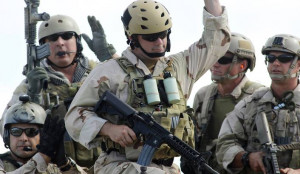
However, as a detailed study of the issue shows, the situation here is developing very revealingly, demonstrating Washington’s desire to, using its military bases and intimidation by weapons,”spread American democracy on the African continent.” Of the numerous methods to achieve these goals, the militarization of the African continent is being undertaken by the White House with the active use of the African Command (AFRICOM) of the US Armed Forces.
AFRICOM was separated by Washington’s strategists in 2008 as an independent military structure “to organise an effective war on terror, to provide security for American economic interests in the region, and to prevent preferential access by other countries to the continent’s natural resources, in particular China, India, Japan, or Russia.” Throughout its existence, AFRICOM has actively used the anti-terror line to increase America’s presence in Africa and to influence political processes taking place there. The most striking example of this was AFRICOM’s coordination of all military operations in 2011 against Libya and the replacement of the ruling authorities there.
To achieve their military-strategic objectives the Pentagon recently created a network of secret bases on the African continent, engaged in combating the activities of regional terrorist groups and gathering intelligence data on a wide range of aspects, including political, trade, and economic ones. AFRICOM has already placed 3,000 of its troops, the so-called Forward Operating Site, directly on the African continent, in the Lemonnier military camp in Djibouti. This infrastructure is used by AFRICOM for military operations in the Gulf of Aden and Yemen, as well as the Horn of Africa. According to an agreement with the authorities of Djibouti it will operate until 2015 with a possible extension to 2020. Other useful bases for AFRICOM are the British Ascension Island in the South Atlantic, as well as Rota (Spain), Sigonella (Sicily), Aruba (Netherlands Antilles), Souda Bay (Greece), and Ramstein (Germany). Furthermore, American armed forces have free access to a number of local air bases and ports in such African countries as Algeria, Botswana, Gabon, Ghana, Kenya, Mali, Namibia, Sao Tome and Principe, Sierra Leone, Tunisia, Uganda, and Zambia. The US has placed military equipment in these locations, which if necessary can be used in joint operations with the armies of these countries.
As follows from the investigation by journalists of The Washington Post in 2013, the creation of an extensive intelligence network by AFRICOM began in 2007 in Burkina Faso with the signing of a bilateral security agreement on “logistical support and medical evacuation in joint military operations.” Then, similar intelligence centres appeared in a number of other African states, notably in Mauritania, Uganda, Ethiopia, Djibouti, Kenya, and even the Seychelles.
From the very beginning the US personnel of the bases consisted exclusively of employees of Special Operations Forces, reporting directly to the US Joint Chiefs of Staff. In organising the collection of intelligence, they actively used not only satellite surveillance capabilities, but also flights by unmanned aerial vehicles and direct contact with the local population. As a result, the Pentagon’s scale of intelligence in Africa is noticeably ahead of the CIA, which is traditionally considered the main supplier of regional information to the US leadership.
In the summer of 2012 the Pentagon, to further strengthen the position of the US Army and conduct “effective” complex operations on the African continent, decided to implement the Regional Alignment Concept (RAC). According to this document, from March 2013 a team of 3,000 US troops located at the US Air Force Base Aviano in Vicenza in north-eastern Italy was assigned to AFRICOM. The assignment of this contingent includes periodic visits in small groups for a period of several weeks or even months to various African states “to assist them in rapidly responding to terrorist threats”, but in reality to continuously monitor African states and strengthen US influence there.
In the future, the Pentagon intends to spread the idea of placing a regional military contingent both in the Middle East and the Pacific.
Since June 2012, the battalion headquarters of the regional armed forces contingent and the Contingency Command Post (CCP) began to operate on the Aviano US Air Force. Currently, the US Army has extended its influence using these tools of Pentagon to 54 African countries.
While on the background of recent developments in a number of countries in North and Central Africa the US State Department is keen to stress that “Washington does not plan to undertake any unilateral military operations on the African continent”, the strengthening of the structure of AFRICOM and its activities suggest otherwise.
According to the assessments of foreign analysts, Washington’s recent placement of Africa under its military control through AFRICOM and the pursuit of its own military-strategic and political-economic aims do not reduce destabilizing processes on the African continent, but rather reinforce them.
Vladimir Platov, Middle East expert, exclusively for the online magazine “New Eastern Outlook”.
